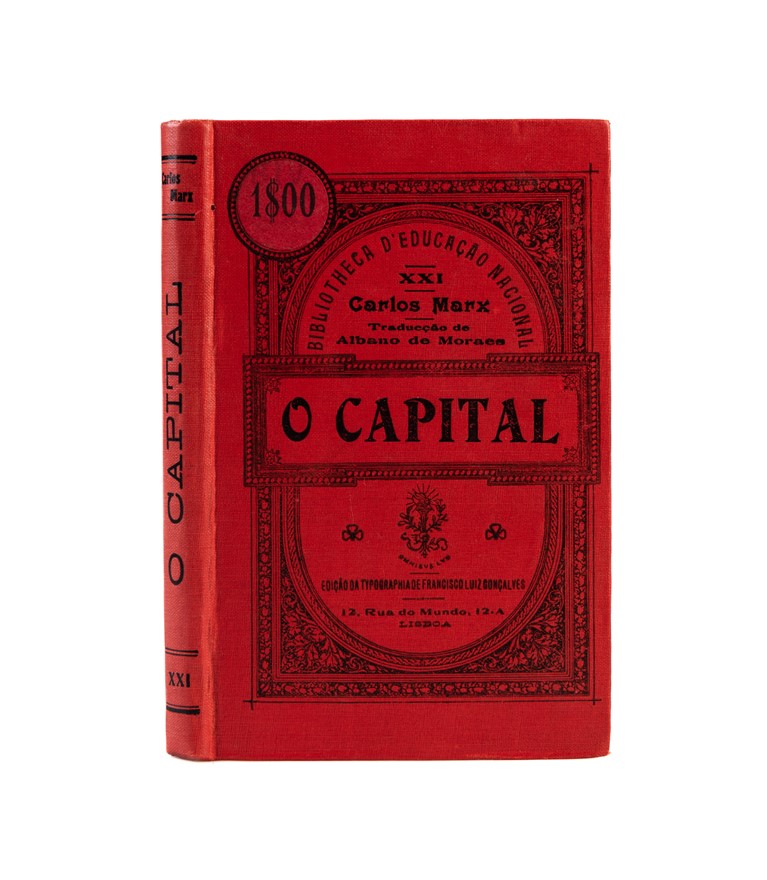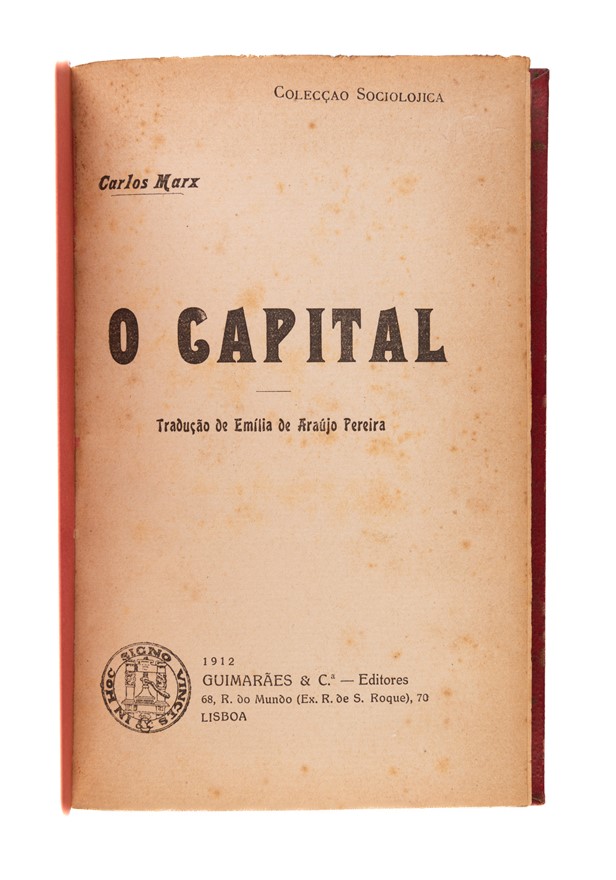O Capital. Resumido e acompanhado de um Estudo sobre o socialismo scientifico por Gabriele Deville.
MARX Karl (1912.)
£3750.00
Please contact us in advance if you would like to view this book at our Curzon Street shop.
A BIZARRE OCCURRENCE: TWO PORTUGUESE TRANSLATIONS PUBLISHED IN THE SAME YEAR
Translated by Albano de Moraes. With a preface by Agostinho Fortes. Small 8vo. 240 pp. Original red cloth, spine lettered and ruled in black, front cover blocked in black. A notably bright, near fine copy. Lisboa, Edição da Typograhia de Fracisco Luiz Gonçalves, Bibliotheca d'Educação Nacional XXI. 1912.
[offered with:] MARX (Karl). O Capital.
Translated by Emilia de Araújo Pereira. 8vo. [3]-246 pp. Without the half title. Near contemporary red pebble grain cloth, spine panelled with five single blind rules, second and fourth panels lettered in gilt, covers panelled in blind, pink endpapers (engraved bookplate of Raul Esteves dos Santos to front pastedown, some occasional foxing). Lisboa, Guimarães & C.a Editores, Colecçao Sociolojica. 1912.
The year 1912 saw the publication of two entirely separate Portuguese translations of Das Kapital with no established priority as to which technically appeared first, a bizarre and seemingly unexplained occurrence marking the first appearances of the text in Portuguese.
Both translations were based on the famous Gabrielle Deville abridgement of the first volume of Das Kapital, originally published in Paris in 1883. Deville’s "internationally acclaimed" abridgement was widely translated, serving as the first appearance of Das Kapital in numerous languages, and arguably "did more to disseminate the arguments of Marx’s revered but unread magnum opus than did any other publication before or since" (Stuart, Marxism at Work, p. 25).
Marxism developed comparatively late in Portugal. Although the Portuguese Socialist Party was founded in 1875, it was blighted by factional struggles and lacked mass support, largely owing to the dominance of anarchism in the Portuguese trade union movement. The Party contributed little to the proliferation of Marxist thought in Portugal and, unlike in other countries, did not directly promote the translation and publication of Marxist texts.
Indeed, very few translations of the works of Marx and Engels appeared in Portuguese prior to the publication of the two translations of Das Kapital presented here. The first Portuguese translation of the Communist Manifesto appeared in 1873 in the journal O Pensamento Social, which also published a translation of Marx’s Inaugural Address of the International Working Men’s Association in the same year. Beyond these two short works, the only other original theoretical work by either Marx or Engels to appear in Portugal prior 1912 was a 1889 translation of Engels’s popular introductory text Socialism, Utopian and Scientific. In contrast, a wealth of anarchist literature was translated into Portuguese during this period, with works by the likes of Proudhon and Kropotkin readily available in left-wing circles.
A full Portuguese translation of Das Kapital would not appear until 1968 in the form of an edition of all three volumes published in Brazil, while a full translation was not published in Portugal itself until 1974.
The first of the two translations offered here is attributed to Albano de Moraes, the identity of whom remains obscure. Little is known of Albano de Moraes in Portugal, although he is credited as the translator of several other minor translations of socialist texts from the same period. The Albano de Moraes translation of Kapital was published in the series Bibliotheca d'Educação Nacional under the editorship of the Portuguese republican Agostinho José Fortes (1869-1940), the first Professor of History at the University of Lisbon’s Faculty of Humanities, who also included a critical introduction to the text. The series primarily consisted of original Portuguese social scientific works, along with translations of the likes of William Stanley Jevons and Gustave Le Bon.
The introduction by the republican Agostinho Fores is noteworthy for its critical tone, announcing that "the Marxist school is positively not an original school" (“a escola marxista não é positivamente uma escola original”) and that, although scientific in nature, "Marxism today fails on many points" (“hoje o marxismo falhe em muitos pontos”).
The Albano de Moraes translation enjoyed considerable success and remains in print in Portugal to this day. It has also seen considerable circulation in Brazil, having been available from Brazilian booksellers in the year of publication. A Brazilian edition of the translation was published in 1931 by Editorial Moderna Paulistana and it was reprinted again by Edições Cultura in 1944 (see Marchetti, ‘A recepção de O Capital no Brasil: 50 anos de sua primeira edição completa 1968-2018').
The second translation presented here was undertaken by Maria Emilia de Araújo Pereira (1884 - ?), an anarchist, actress and translator. Emilia de Araújo Pereira came from a theatrical background and worked alongside her husband, the playwright Manuel Joaquim de Araújo Pereira (1871-1945), at the Escola-Teatro de Araújo Pereira, a progressive theatre company and acting school. She also produced more literary translations, including two notable translations of the Norwegian playwright Henrik Ibsen – presumably on account of Ibsen’s anarchist credentials.
Her translation of Das Kapital was published in the Colecção Socioloógica, a series of original texts by Portuguese anarchists such as Emílio Costa alongside translations of works by major figures of international anarchism, including Peter Kropotkin and Leo Tolstoy, as well as two translations of Friedrich Nietzsche – reflective of Nietzsche’s adoption by anarchists for his sustained critique of Christianity, despite his repeated explicit dismissals of anarchist philosophy. The series also included another of Emilia de Araújo Pereira’s translations, an edition of the French anarchist Augustin Hamon’s Psychologie de l'anarchiste-socialiste published in 1915.
The Araújo Pereira translation seems to have received a smaller circulation than the Albano de Moraes version and is relatively obscure by comparison, appearing less frequently in the literature concerning the development of Marxism in Portugal. The quality of Araújo Pereira’s translation of was later criticised by Alfredo Margarido, who produced a new Portuguese translation of the Deville abridgement in 1975, writing in his preface that Araújo Pereira’s translation was “exemplarily unfaithful to the text” and “debatable” (“exemplarmente infiel ao texto” e “discutível”, quoted in Novo, ‘Há um marxismo português?’). Given the explicit anarchism standpoint of the Colecção Sociológica along with Araújo Pereira’s own political inclinations, it is reasonable to suggest that these apparent discrepancies in the translation were a case of bowdlerisation, imposing an anarchist interpretation on the text, rather than technically poor translation work.
It is not unprecedented in the history of Marx translations for two entirely separate versions of the same text to appear in quick succession in the same language. For example, rival socialist factions in Spain published separate translations of Das Kapital in the space of a year in 1886 and 1887, while two rival Bulgarian translations of Kapital appeared in 1910 as a result of an earlier split in the Bulgarian Workers’ Social Democratic Party. In both cases each party was aware of the other’s project and the rival translations were produced in direct response to each other, representing struggles over conformity to Marxist orthodoxy.
However, the appearance of the two Portuguese translations of Das Kapital was certainly not the result of warring political factions. Indeed, if anything, neither of the groups behind either translation were exactly sympathetic to Marxism, with the Albano de Moraes translation containing a highly critical introduction by Agostinho Fortes and the Araújo Pereira version appearing in a thoroughly anarchist publication with question marks existing over the faithfulness of the translation.
Instead, the circumstances surrounding the Portuguese translations suggest coincidence rather than competition, with both translations most likely having been produced in ignorance of the other.
Interestingly, the Emilia de Araújo Pereira translation makes no direct attribution to Gabriel Deville on the title page, with the only reference to his authorship appearing at the end of the preface, which is discreetly signed “G.D.” and dated ‘Paris … 1883’. To enter the realm of pure speculation, this may suggest that the Albano de Moraes translation was the first to be published, with the Colecção Sociolo´gica removing any direct reference to Deville in the Araújo Pereira translation to make their publication appear as a more of a separate entity.
Ultimately, however, the question of precedence between the two translations remains a mystery.
Both works are rare.
Albano de Moraes translation: OCLC list two copies in North America, held by the Universities of Kansas and Wisconsin, as well as one copy in Brazil at the University of Sao Paulo and another in Germany held by the Bibliothek der Friedrich-Ebert-Stiftung.
Emilia de Araújo Pereira translation: OCLC list only one copy, held by the University of Kansas.
Stock Code: 243111






